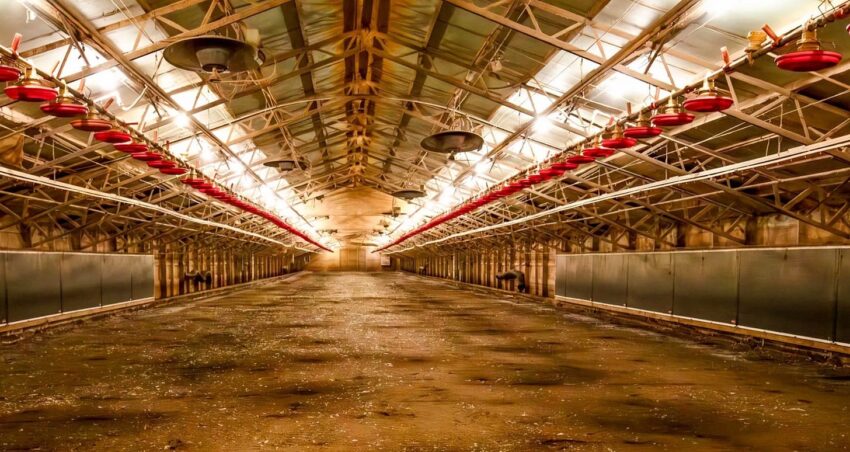
https://investigatemidwest.org/2024/05/08/early-morning-calls-barren-chicken-barns-millions-in-debt/

… The company’s plans came at a human cost. Tyson closed eight meatpacking plants in 2023, six of them chicken processing and two beef processing. It laid off more than 4,200 workers across all of its plants last year.
The company has a lot to gain from its contract growers. In 2023, Tyson Foods had nearly $53 billion in sales — a third of which was from chicken. The company operates 183 chicken facilities across the country, which include processing plants, hatcheries, feed mills and grain elevators. The company’s website states it contracts with more than 3,600 poultry farmers nationwide.
The vertical consolidation (the same company owning hatcheries, feed mills, grain elevators and processing plants) and horizontal consolidation (contracts with over 3600 farmers growing eggs, broiler, chicks, etc.) give Tyson extraordinary power to control all aspects of the chicken business and squeeze the biggest profits from everyone it deals with. It also has extraordinary power in other meat industries.
It did make chickens cheap—but now this monopoly power is also directed at the consumer, who is paying a lot more for less quality. Food in nearly all of Europe and the rest of the world is now cheaper than in the US. But the quality in the US is one of the worst, due to the immense consolidation and use of the cheapest inputs to feed poultry and livestock, and lack of care by agribusinesses to give back to the soil what is taken out using compost and manure, instead pushing chemicals that fail to provide the nutrition we seek.
From the pivotal early morning phone calls to the millions in debt, former Tyson contract growers who spoke to Investigate Midwest said they have had to take out upwards of $2 million loans to become Tyson contract growers. Their contracts canceled, they’re now saddled with massive debt. They said the company pushed them to go into more debt to upgrade their barns to meet company demands. Growers also said the company told them that they would be given chickens to raise for as long as they had loans on their barns.
Now that their contracts have abruptly ended, Tyson contract growers said they aren’t able to pay off the debt. Growers are staring down bankruptcy and foreclosures. Some have sold off land or other property to pay off debt while others have retired or looked for work off the farm….
Here is another story. Why is this happening? Because in large part, the mega-food companies have been able to get away with it. Now farmers are banding together and filing antitrust lawsuits, while the federal government should have stopped these practices already.

DEXTER, Missouri – On an early August morning in 2023, Shawn Hinkle received a call from one of his technicians at Tyson Foods who, through tears, told him the company’s plant in Dexter was shutting down.
Hundreds of jobs at the poultry slaughterhouse would be lost and farmers like Hinkle, who contracted with Tyson to raise egg-laying hens, would be out of business.
A decade earlier, Hinkle borrowed $2.3 million to build two chicken houses on his land. After struggling to keep up with Tyson’s standards and investing in his farm, Hinkle now owed $2.8 million and faced the prospect of losing it all in bankruptcy.
Tyson said the Dexter plant closure was part of a national effort to streamline production and boost profits — the company also closed three other poultry plants and two beef packing plants.
But Tyson’s explanation didn’t make sense to Hinkle and several other farmers who, in December 2023, sued the giant meat company for breaking its contracts.
As the lawsuit moves forward, a Watchdog Writers Group analysis of documents filed in the case, in partnership with Investigate Midwest, reveals Tyson coordinated closely with Cal-Maine Foods, the company that ended up buying the Dexter plant. That coordination prevented farmers from continuing their same operations with another Tyson competitor.
Documents also show Tyson tried to prevent its former contract farmers from seeking legal remedies over the broken contracts, and has possibly attempted to discourage farmers from speaking with federal officials and journalists.
Tyson Foods declined to answer detailed questions about the allegations of the lawsuit.
After purchasing the Dexter plant, Cal-Maine offered contracts to local farmers if they retrofitted their farms to raise table egg-laying hens rather than chickens for meat. [Putting them even more into debt—Nass]. Unlike many area farmers, Hinke raised egg-laying hens to produce more chicks, which were sent to other farmers. Raising hens for Cal-Maine would have required a significant operational overall for Hinkle and other farmers.
But Cal-Maine’s offer came with a catch: The farmers would have to agree not to sue Tyson Foods for any losses because of the plant closure, according to court filings…
[…]
Via https://merylnass.substack.com/p/how-farmers-become-serfs-or-bankrupted
Click this link for the original source of this article.
Author: stuartbramhall
This content is courtesy of, and owned and copyrighted by, https://stuartbramhall.wordpress.com and its author. This content is made available by use of the public RSS feed offered by the host site and is used for educational purposes only. If you are the author or represent the host site and would like this content removed now and in the future, please contact USSANews.com using the email address in the Contact page found in the website menu.








